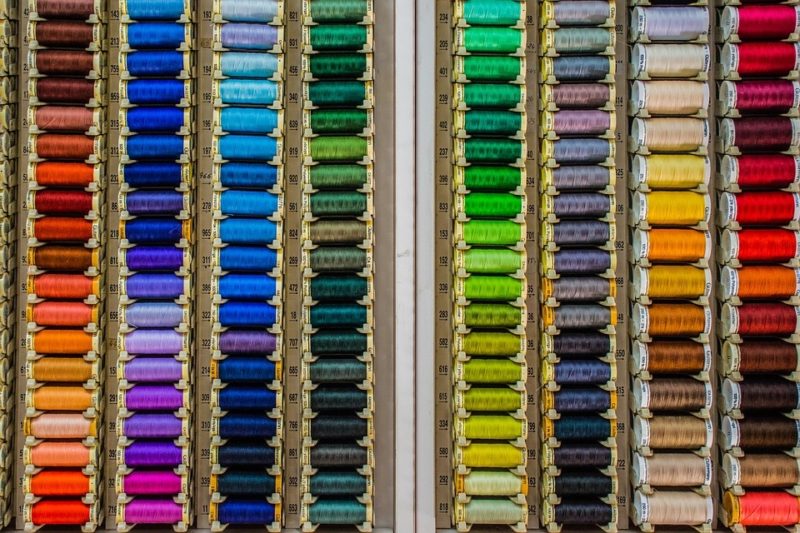The answer to what is the strongest sewing thread is upholstery nylon. But before you run away with that answer, please read this short but in-depth article to know why this thread is the strongest. You will also know when to use it and how different sewing threads compare in terms of strength and durability.
Why do you need to learn various strong threads? Some projects and materials require a thread that can handle the heavyweight fabric without breaking. For example, when learning how to topstitch with a sewing machine, you might also need the thread to ensure perfect stitches.

What Is The Strongest Sewing Thread: The Secret For Perfect Stitches
The strongest sewing thread is upholstery nylon because of its composition. To give you a quick explanation, the molecules that make nylon up are knitted tightly together, which leads to higher tensile strength. As a result, the thread will not snap quickly, and upholstery nylon even has a resin coating that makes it more durable.
When to use a nylon thread?
Nylon thread is helpful when doing upholstery projects since it can handle challenging materials without breaking or causing skipped stitches. You can also use it when sewing items that will be used outdoors since it won’t fade quickly against the sun or even get damaged from mildew and weather. And if your sewing project should be done at higher speeds with a potential for abrasion, nylon thread would be the best pick.
What Is A Very Strong Thread?
Kevlar thread
Another strong thread that would be ideal for sewing projects that will be exposed to weather, wear, and stress is the Kevlar thread. It’s a special material made from phenylediamine with terephthaloyl, which results in high heat resistance. It is also often used for sewing harnesses, conveyor belts, and even when reinforcing plastics.
Metallic thread
A metallic thread can be strong, depending on the quality. The best ones have a strong nylon core, which helps with their durability. It would also not require a lubricant and is perfect for stitches that need some sheen to them.
Coated thread
Threads can also be differentiated with how they are processed. This includes lubricating, winding, and twisting. With this in mind, the strongest threads are those coated with resin or wax. However, be mindful of sewing with glazed threads because the coating can rub off in some sewing machine parts and congest the thread path.
Bonded thread
Threads also differ from their construction materials. The fiber types can be twisted and spun, and the quality can dictate if the thread is prone to breaking quickly or producing too much lint. For example, the bonded thread would be strong because of the enhancement coating that reduces friction.
Still can’t decide which thread to get for your heavyweight fabric or high-stress project? Why not store different types and then learn how to make a sewing thread holder, so you’ll always have a diverse stash to choose from for each sewing project?
Which Thread Is Stronger Polyester Or Cotton?
Polyester thread mainly spun polyester thread, is stronger than cotton thread. It retains shape for longer with more tensile strength than cotton or even rayon. However, please remember only to use polyester thread with synthetic materials. Sewing a natural fabric with synthetic thread can break down the natural fibers of the material.
Furthermore, please note that there are polyester threads are designed for sewing heavy knits, denim, leather, and even upholstery. They are heavyweight and designed to produce consistent tension and stitches. An example of this is the Coats & Clark Inc. Dual Duty Heavy Thread.
What Is The Thickest Sewing Thread?
The thread size dictates the thickness of the sewing thread. In the US, the most common way to measure threads is by the weight system. This does not follow a direct numbering system, but instead, the larger the number, the finer the thread.
An example between a 60 weight thread and a 100 weight thread. The thinner thread would be the 100 weight thread compared to the 60 weight thread. And since the scale is from 30 to 120, the thickest would be the 30 weight thread.
Can You Use Nylon Thread In A Sewing Machine?
You can use a nylon thread on the sewing machine, but some nylon sizes are only compatible with commercial or industrial machines. The lightest one is size 15, often used for home sewing machines, while the thickest nylon thread you can use for home machines is size 69. Then, sizes 92 to 554 are nylon threads meant for heavy-duty sewing machines.
Which Sewing Stitch Is The Strongest?
Since you know which sewing thread is the strongest, take note of the strongest sewing stitch, the backstitch. It is often used at the beginning and end of stitch rows because of its durability. This is because it goes behind the previous stitch.
Conclusion
Was this article helpful? We just answered what is the strongest sewing thread, and discovered that it’s nylon. You can also opt for coated or bonded thread because they are among the most durable types.
When sewing heavyweight fabrics or projects that will be worn down, it’s best to use high-quality, strong threads. We hope this article answered all your questions, but feel free to leave more below if you still have any.
